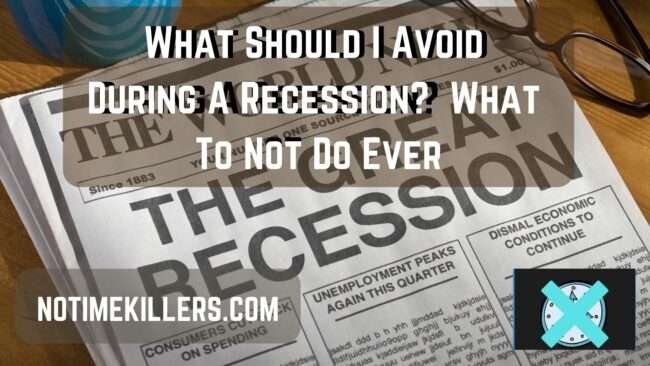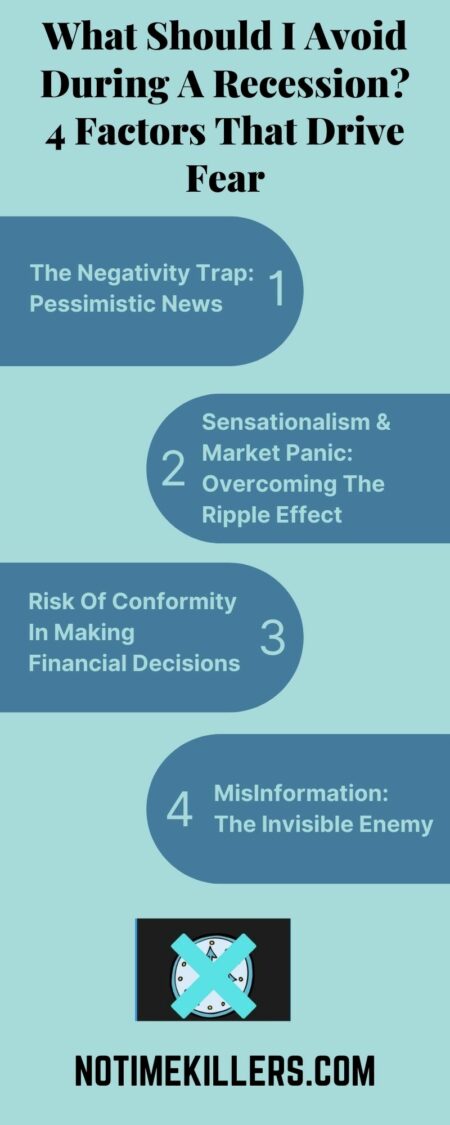As we navigate the choppy waters of an economic recession, one question often arises: what should I avoid during a recession once it hits?
You might be surprised to hear that one key piece of advice is limiting your news media consumption.
As economic recessions loom, the role of news media becomes ever more pertinent.
However, despite its capacity to inform and enlighten, there are several reasons why limiting exposure during a recession might be beneficial.
In this post, I will discuss some of those reasons to limit your new consumption. If you understand how it all works, you’ll be much better off during hard economic times.
Note: We may include products or services that will be helpful to our readers. This post may contain affiliate links. For more information, please review the affiliate disclosure page.
- The Negativity Trap: Unraveling The Impact Of Pessimistic News
- Sensationalism And Market Panic: The Ripple Effect Of Exaggerated News
- Misinformation: The Invisible Enemy In Economic Reporting
- Flocking With The Herd: The Risk of Conformity In Financial Decision-Making
- The Personal Growth Opportunity: Shifting Focus To Improve Your Skillset

What should I avoid during a recession?
During an economic recession, avoiding excessive news media consumption may be beneficial.
Its often negative bias and potential for sensationalism can contribute to undue stress and anxiety, leading to impulsive or poorly considered financial decisions.
Instead, utilize this time for personal growth, such as improving your skillset or starting your own business.
The Negativity Trap: Unraveling the impact of pessimistic news
Recent studies have shown a constant negativity bias in news coverage, especially during economic recessions.
Headlines are often filled with disaster, uncertainty, and financial ruin.
These grim narratives can provoke a range of adverse psychological effects, such as increased stress and anxiety levels.
This added stress could decrease risk tolerance and encourage hasty, potentially ill-considered financial decisions during financially uncertain times.
To avoid this spiral, it’s advisable to establish a balanced intake of information, which might mean reducing exposure to overly negative news coverage.
Additionally, news outlets have been known to employ sensationalist tactics, exaggerating situations to attract more viewers.
Sensationalism & market panic: The Ripple Effect of exaggerated news
In the context of a recession, this can create an inflated sense of crisis and fear, potentially leading to market panic.
Past recessions have borne witness to how such panic can provoke unwise financial decisions that leave lasting damage.
It’s important, therefore, to temper the influence of sensationalized news and seek out measured, non-exaggerated insights into the economy.
A lesser-discussed aspect of news coverage, particularly in the financial world, is its potential to drive herd mentality.

Misinformation: The Invisible Enemy in economic reporting
Media narratives around economic trends often sway public perception, encouraging people to follow popular investment trends.
However, what suits the masses might not suit an individual’s specific financial situation.
The 2008 recession serves as a poignant reminder of how following the herd can lead to disastrous financial outcomes.
During trying economic times, independent financial thinking becomes invaluable – and distancing oneself from the pervasive narratives of the news can help nurture this independence.
Curious to learn the basics of building a blog (or starting a YouTube channel)? Check out my top recommendation for getting started.
Open up a free starter account and give it a test drive to see if it fits you.

Recent example
It wasn’t until a few years ago when the media was covering COVID-19 extensively, to the point where some of the claims made were completely false.
For instance, claiming that COVID was a deadly virus and the need to take shelter may have been too far-fetched. In that case, the narrative that the media ran on did not match the reality of what was going on at the time.
Flocking with the herd: The risk of conformity in financial decision-making
Finally, the risk of misinformation cannot be underestimated.
While most news outlets strive to deliver accurate reporting, the fast-paced nature of news and the complexity of economic dynamics can lead to unintentional misinformation or incomplete reporting.
Making financial decisions based on such misleading or faulty information can have severe implications.
It’s crucial, therefore, to adopt a more comprehensive, personal approach to understanding the economic climate, seeking information from diverse sources, and verifying facts before acting upon them.
So, if tuning out of the news during a recession is a reasonable strategy, what should one do with that newfound time and peace of mind?
A relevant article from notimekillers.com
Read next on “Is Another Recession Coming? Why It Matters To You“, to understand the potential impact it can have on your future. That’s if it all depends on how severe it will be once it arrives.
The personal growth opportunity: Shifting focus to improve your skillset
That is where the power of personal growth comes in. Rather than being consumed by market volatility, use this opportunity to work on improving your skill set.
In the face of economic adversity, the most resilient individuals are those who can adapt and seize new opportunities – and there’s no better way to achieve this than by starting your own business.
It isn’t just a way to earn money; it’s a chance to learn, grow, and possibly even innovate in your industry.
What can you do in the meantime?
Take a step back and consider your passions, your skills, and the needs of the community around you.
Can you identify a missing service or product or an existing one that you could improve?
It’s easy to feel disempowered during an economic recession, with headlines screaming crisis and market indicators turning red.
But remember, the economy is not the only driver of your financial future. Your skills, decisions, and resilience play a far larger role.
So, switch off the news and start channeling your energy into something positive and productive.

A relevant article from notimekillers.com
Read next on “How To Develop The Right Business Mindset: F–K Recession” to change how you think about handling tough economic times. You do not have to participate in the next recession.
Final Words
While the news coverage can be informative, limiting its consumption during an economic downturn might do more good than harm.
It’s a golden opportunity to shift from passive consumption to active growth – turning away from the headlines and towards your own headline.
The story of a new business venture, skill, or path to financial resilience.
Remember, the best way to predict the future is to create it. Now, go out there and start creating.
Your Turn: What will you do to encounter the challenges of the next recession?
I want to get your thoughts on this topic.
In your experience, how has news consumption during economic downturns affected your decision-making and overall stress levels?
How have you successfully managed to balance staying informed with maintaining your mental health?
If you were to limit your exposure to the news during a recession, what activities would you focus on to improve your skills or start your own business?
Feel free to share your thoughts by leaving a comment below. I look forward to reading your responses and’ll gladly respond promptly.
If you got value from this article, please bookmark this website to visit later for new posts every week. Spread the word to others. Sharing is caring! To get more of this type of content, you won't want to miss out my daily email letters. These are worth some golden nuggets and best tips to help you in your business. Sign up today! Count me in on the daily letters via email! For the latest videos that come out every week, subscribe to the YouTube channel. Also, be sure to check out our new space on Twitter X! YouTube Twitter (X) Medium Profile
Eric is the owner and chief editor of notimekillers.com. He takes great pride in helping people manage their time and grow their businesses. Eric is a firm believer in financial and time freedom, as he believes in financial independence and taking ownership of your time. “Time is your most important asset. It can be your best friend or worst enemy. How you use your time can shape the future you desire to have.” In his leisure time, Eric loves to write and read whenever possible. He enjoys going for long walks outdoors while doing in-home workout videos every week. You can also connect with Eric via LinkedIn.

